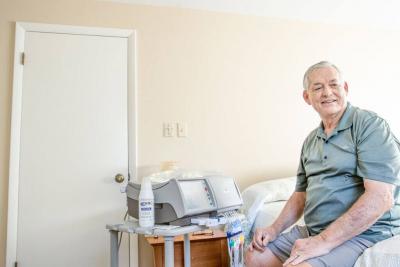
While DaVita continues to invest in patient education on home modalities, the kidney care company is also enhancing educational support for physicians. DaVita’s Physician Support Network (PSN) was established to support qualifying nephrologists and their practices overcome barriers associated with home programs, improving home modality choice and supporting clinically successful home dialysis programs.
The PSN started in summer 2020 with Dr. Mihran Naljayan, now DaVita’s chief medical officer for Home Modalities, and Dr. Mark Shapiro, vice president of Home Therapy Support at DaVita, leading the initiative. Before the PSN was created, both physicians were familiar with common issues physicians faced in developing successful home programs through their conversations with other nephrologists.
“We both realized the impact we can have by being a peer-to-peer resource for physicians to understand what local barriers and gaps that may exists, and how we can help break those barriers down,” says Dr. Naljayan.
Dr. Naljayan, himself, had found peer support helpful earlier in his career. In 2014, he took over the home dialysis program at Louisiana State University (LSU). At the time, Dr. Naljayan recognized a need to learn more through engaging with other physicians experienced in home dialysis. Through national meetings and conversations with individuals like Dr. Marty Schreiber, DaVita’s Home CMO emeritus, Dr. Naljayan realized not only the benefits of home dialysis for patients, but also the need for more support in the nephrologist community.
Now, Dr. Naljayan is committed to identifying successful and consistent processes for physicians to assist them in all aspects of home dialysis. This includes the development processes for things like patient education on kidney disease before kidney failure, urgent-start peritoneal dialysis (PD) for individuals who crash onto dialysis, and strategies for reducing peritonitis events. “We are willing to make a practice level commitment to understand what the practice’s goals are as it relates to home dialysis for their patients,” he explains. We are then able to provide educational content and management support to achieve greater levels of success.
“Nephrologists today are extremely busy taking care of so many patients in different clinical settings—whether it’s their CKD practice, the hospital or in the dialysis facilities.” Dr. Naljayan says. “Many are focused on providing the best clinical care they can for their patients, but not always realizing what resources are available to them to help expand the scope of access to therapies for their patients.”
Through the PSN, Home Dialysis Physician Experts meet virtually or in-person with nephrology groups to discuss optimal dialysis starts, urgent-start PD, conversions from in-center hemodialysis to a home modality, dialysis prescription management, empowering home dialysis nurses and more. A central director helps coordinate meetings with the experts to meet the needs of physician partners and local leaderships. As barriers come up, partnered physicians can reach out directly to one of the experts or connect with the larger network of experts.
Most of the meeting focuses on addressing local issues, including patient education, surgical or hospital barriers, local dialysis center resources or even nephrologist skill sets.
“Many nephrologists struggle to overcome the barriers that prevent great success in home dialysis. They are too often overwhelmed by their job responsibilities to work their way past these barriers,” explains Dr. Shapiro. “We bring in a team of home dialysis experts and local operators to help them strategize and overcome the obstacles.”
In a recent analysis, practices who engaged with the PSN from July-December 2021 are seeing 30% higher rates of new starts on a home modality and a 27% higher rate of urgent PD starts.[1]
Dr. Shapiro explains:
“By learning from each other, physicians can help ensure their patients are getting the care they need—where it’s right for them.”
[1] Data based on practices that engaged with the Physician Support Network from July-December 2021.









